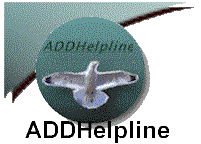
ADDHelpline is your ADD Information Source
If you are interested in learning more about how you can receive EEG Neurotherapy right in your home, using your own computer, enter your email address below.
Regular Features
THE
PARENT COACH
Dr.
Steven Richfield provides articles on many different aspects of raising a child
with ADHD.
ASK
THE ADVOCATE
Each
month we our advocate will be answering questions from our visitors about yours
and your children's rights in the educational system.
PARENTS
TALK
A mother is trying to help her teenage son learn anger management.
MOTIVATION
TIPS
Five great ideas for motivation, including The Shoe Race, Trading Places
and more.
ORGANIZATION
TIPS
Organize your child at home, and maybe find some tips that will help you
as well.
ADHD
IN THE NEWS
Headlines about ADHD, Learning Disability and Mental Disorders
Study on ADD and TV
The recent study published on watching television between the ages of one and
three and the possible link to ADD/ADHD did not take many considerations into
account. The author of the study even admits that he cannot conclude that
television watching and ADD/ADHD are linked.
Read the
Article
Back To This Month's Newsletter
Why Can't My Child Behave?
by Jane Hersey
My son, age 16 has ADHD and has always had a reaction to anything containing red dye. He would become easily frustrated, highly impulsive and anger quickly. Although removing red dye did not take away the symptoms of ADHD, it did prevent outbursts and erratic behavior. I have always been a true believer that the foods that we eat can affect people in different ways. It is important to discover if your child's behavior may be a result of foods and additives. This book helps to develop a plan of action to do just that. It is based entirely on the Feingold Diet, which has been used for many years to help over active and disruptive children to calm their emotions and actions.
The book explains the many additives and foods that are most likely to cause reactions and provides a basic diet for starting the program and determining if your child needs to have items eliminated from his/her diet.
This book is highly recommended for anyone wanting to start a new program eliminating foods that might be causing a problem.